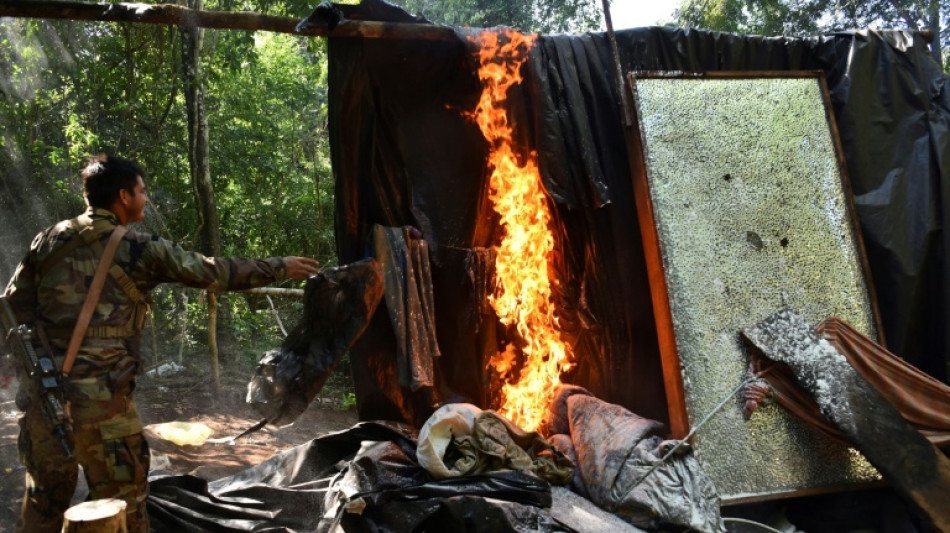
-
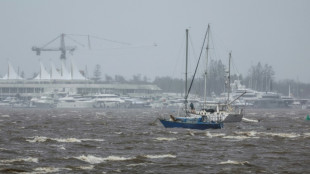 Wild weather leaves mass blackouts in Australia
Wild weather leaves mass blackouts in Australia
-
China consumption slump deepens as February prices drop

-
 'Things are different' Djokovic says after another early exit at Indian Wells
'Things are different' Djokovic says after another early exit at Indian Wells
-
Colombian guerillas release hostage security forces

-
 France lose Dupont but Six Nations title on the cards after thrashing Ireland
France lose Dupont but Six Nations title on the cards after thrashing Ireland
-
Phone bans sweep US schools despite skepticism
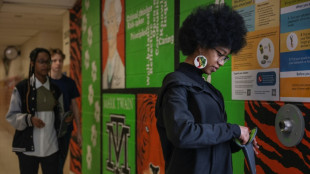
-
 Did Ukraine have to become a partisan US issue?
Did Ukraine have to become a partisan US issue?
-
Djokovic crashes out of Indian Wells opener

-
 Britain's King Charles calls for unity in 'uncertain times'
Britain's King Charles calls for unity in 'uncertain times'
-
Morikawa seizes lead at Arnold Palmer after birdie rally

-
 Alcaraz, Keys breeze into Indian Wells third round
Alcaraz, Keys breeze into Indian Wells third round
-
Record-setting Skotheim claims European indoor heptathlon title

-
 Inter survive Monza scare to extend Serie A lead
Inter survive Monza scare to extend Serie A lead
-
Argentina port city 'destroyed' by massive rainstorm, 13 dead

-
 Townsend relishing 'toughest fixture' in France after Scotland's Six Nations win over Wales
Townsend relishing 'toughest fixture' in France after Scotland's Six Nations win over Wales
-
Colombian guerillas release hostage security forces: AFP

-
 Some 200 detained after Istanbul Women's Day march: organisers
Some 200 detained after Istanbul Women's Day march: organisers
-
Draper sends Brazilian sensation Fonseca packing at Indian Wells

-
 Man with Palestinian flag scales London's Big Ben clock tower
Man with Palestinian flag scales London's Big Ben clock tower
-
Protesters rally on International Women's Day, fearing far right

-
 Australian Open champion Keys cruises into Indian Wells 3rd round
Australian Open champion Keys cruises into Indian Wells 3rd round
-
Barca Liga match postponed after club doctor dies
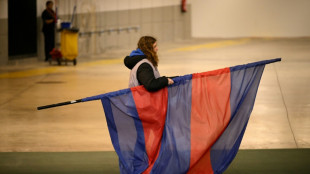
-
 Alldritt revels in 'historic' French performance to thrash Irish
Alldritt revels in 'historic' French performance to thrash Irish
-
Watkins haunts Brentford to revive Aston Villa's top-four hopes

-
 Pulisic double rescues AC Milan at lowly Lecce
Pulisic double rescues AC Milan at lowly Lecce
-
Mirrors, marble and mud: Desert X returns to California
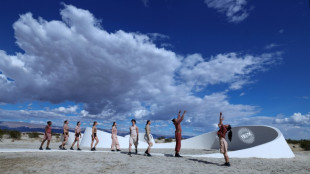
-
 'Grieving': US federal workers thrown into uncertain job market
'Grieving': US federal workers thrown into uncertain job market
-
Slot blast fuelled Liverpool's comeback against Southampton

-
 Russell back in the groove as Scotland see off Wales in Six Nations
Russell back in the groove as Scotland see off Wales in Six Nations
-
Remains of murdered Indigenous woman found at Canada landfill

-
 French throng streets for International Women's Day rallies
French throng streets for International Women's Day rallies
-
Security forces taken hostage by Colombian guerillas released: AFP

-
 Pope responding well to pneumonia treatment, Vatican says
Pope responding well to pneumonia treatment, Vatican says
-
France coach Galthie 'angry' at Dupont knee injury

-
 The French were clinical, we were not, says Irish coach Easterby
The French were clinical, we were not, says Irish coach Easterby
-
Sleeping man is struck by train in Peru but survives

-
 Dembele hits double as PSG win ahead of Liverpool return
Dembele hits double as PSG win ahead of Liverpool return
-
Bosnia top envoy backs court ruling against separatist laws

-
 Bayern get away with shock loss as Leverkusen fall to defeat
Bayern get away with shock loss as Leverkusen fall to defeat
-
'We have to rebuild a city,' Argentine official says after storm kills 10
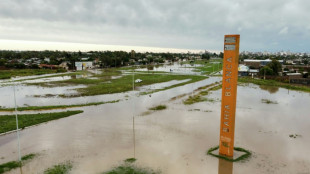
-
 Guardiola urges troubled Man City to fight for Champions League place
Guardiola urges troubled Man City to fight for Champions League place
-
Salah fires Liverpool 16 points clear, Forest beat Man City

-
 Liverpool fight back to go 16 points clear as title moves closer
Liverpool fight back to go 16 points clear as title moves closer
-
Hermes celebrates felt at Paris Fashion Week

-
 Bayern unpunished for shock loss as Leverkusen fall to defeat
Bayern unpunished for shock loss as Leverkusen fall to defeat
-
Majestic France destroy Irish Six Nations Grand Slam dreams

-
 Santner wants New Zealand to keep 'open mind' for Champions Trophy final
Santner wants New Zealand to keep 'open mind' for Champions Trophy final
-
Pogacar remounts after fall and charges to Strade Bianche win

-
 Negri wants Italy to 'make things right' against England in Six Nations
Negri wants Italy to 'make things right' against England in Six Nations
-
Attack on Iran nuclear plant would leave Gulf without water, Qatar PM warns
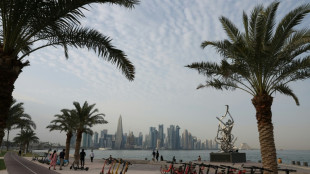

Paraguay's slow slide into a state held hostage to drug trafficking
Two Paraguayan officials murdered in as many weeks: an anti-drug prosecutor executed while on honeymoon in Colombia and a mayor gunned down outside his office.
These incidents have sent a disturbing signal that parts of the South American country are falling under the influence -- and bullets -- of organized crime and drug traffickers.
A few months ago, the mayor of Pedro Juan Caballero, a northeastern city on the border with Brazil, complained bitterly that mafia groups "walk around armed and no-one does anything.
"How can you walk around the streets armed with an AR-15 or AK-47?" asked Jose Carlos Acevedo, 51.
"The citizenry knows what happens here but (apparently) the police don't know and the public prosecutor's office doesn't know."
It was one of the last interviews the mayor would give before being struck on May 17 by a hail of bullets as he left town hall.
A week earlier, Marcelo Pecci, a leading prosecutor in Paraguay's fight against drug trafficking and money laundering, was shot dead execution-style on a Colombian island in front of his wife.
One line of inquiry, according to sources close to the investigation, has pointed to the suspected crime boss Sergio de Arruda Quintiliano Neto, known as "The Minotaur", who has been detained since 2019 in Brazil.
The alleged leader of the Brazilian First Capital Command (PCC) gang was arrested as part of a probe led by Pecci.
At the time of his death, the 45-year-old Pecci was compiling evidence against captured criminals belonging to the PCC and Red Command (CV), groups that originated in Brazil but now also operate in Paraguay.
A small, landlocked country of 7.3 million between Argentina, Bolivia and Brazil, Paraguay has traditionally been known as a marijuana producer.
But "we have become the regional distribution center for Andean cocaine. From Paraguay, shipments are sent through the ports of Buenos Aires and Montevideo to Europe," criminologist Juan Martens from the National University of Asuncion told AFP.
The country "is located in a strategic region for smuggling and drug-trafficking," said Arnaldo Giuzzio, a former interior minister and anti-drugs chief.
- 'Big fish starting to fall' -
In Pedro Juan Caballero, the capital of northeastern Amambay province, there is a volatile mix of anti-drug trafficking operations, score settling between rival organized crime groups and murders of officials who try to tackle the scourge.
Even family members can be targeted: the niece of former mayor Acevedo was killed in 2021.
The province, a hub for transporting drugs into neighboring Brazil, had a murder rate in 2020 of 70 per 100,000 inhabitants -- 10 times the national average.
Just last week, police in that region destroyed 600 tons of marijuana in a highly publicized operation following Pecci's murder.
Over the course of this year, more than 1,000 hectares of marijuana crops have been destroyed, while 3,400 tons of the plant has been taken off the market, "causing drug traffickers to lose $103 million," Paraguay's anti-drugs spokesman Francisco Ayala told AFP.
On top of that, 2.2 tons of cocaine have been seized.
President Mario Abdo Benitez, who has faced harsh criticism for a perceived lack of success against the drug traffickers, trumpeted the "record" figures and the fact that "big fish are starting to fall."
But he also painted a bleak picture of a country where "organized crime pays politicians, pays parliamentarians, pays prosecutors, magistrates and various authorities," without naming any.
Martens says crime gangs have been "progressively taking control of various institutions" in the country.
"Here in Paraguay we have drug-breeding, drug-soyabean, drug-sport (through club owners), drug-religion, drug-universities."
Abdo says there is "a war" being waged against drug trafficking that "will be tough and will last."
Paraguay's Congress recently began debating new legislation aimed at better controlling the nation's airspace, which Martens has described as the "open sky."
Some members of Congress hope to give the Air Force more authority to shoot down non-identified or "hostile" tourist planes frequently used by drug traffickers.
But the military has said that to tackle the problem it prefers improved radar systems and airplanes over new legislation.
A.Jones--AMWN